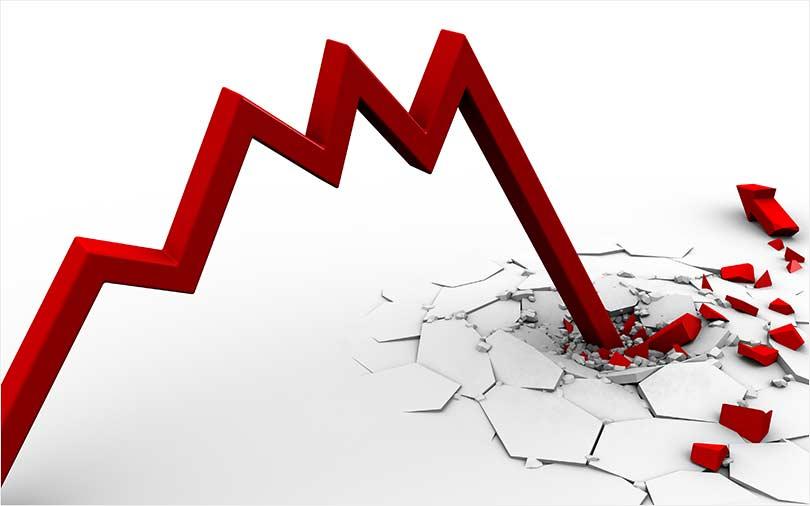India’s stock markets continued to crack for the third consecutive week, owing mostly to the rout across global bourses led by the US. Global markets were spooked by fears of an imminent US-China trade war, which could spread to other countries.
This, after US president Donald Trump directed his country’s trade representative to level tariffs on $50-billion of Chinese imports, following a seven-month probe into Chinese theft of US intellectual property.
A CNN report said the probe had found that China had either “stolen or coerced” US companies into giving their intellectual property through various means, including the “requirement that foreign companies (have to) partner with Chinese companies to access the Chinese market”.
While the Chinese have struck back with tariffs on $3 billion worth of US exports so far, they could up the ante and the tariff hikes could extend to a significant portion of the $130-billion of goods exported by the US to China.
Indian stock markets ended the week in the red, with the BSE Sensex down 1.61%, as Asian markets wiped out all their gains made so far in 2018.
However, a falling stock market is not the only thing that investors and consumers should be worried about. Energy prices in India are set to rise, putting more upside risks on inflation in the coming weeks and months.
On 22 March, the Press Trust of India reported that the government is set to raise domestic natural gas prices to their highest levels in two years – a move that will not only mean higher CNG prices, but also raise electricity tariffs and the cost of production of urea. The subsidised fertiliser contributes significantly to the exchequer’s subsidy bill each year.
India also imports half its natural gas requirements at double the domestic rate, which is revised every six months.
While this could mean some more political heat, for now the government already has its hands full with the fallout of l’affaire Cambridge Analytica, a UK-based propaganda firm, which used data analytics and worked with political parties across several countries, including the US, Africa and India. The firm used Big Data to build psychological profiles of voters and then target electoral advertisements and fake news at them, via platforms such as Facebook.
As news reports from the UK and the US by The Guardian and Channel 4, said that Cambridge Analytica had used dirty tricks to try and influence electoral outcomes across several countries, the ruling Bharatiya Janata Party (BJP) and the opposition Congress, besides other political parties, traded charges, accusing each other of employing Cambridge Analytica, via its Indian associates, including a company promoted by the son of prominent Janata Dal (United) leader KC Tyagi.
Meanwhile, political activist Anna Hazare, too, has begun an indefinite hunger strike, demanding that the government pass the Lokpal Bill in Parliament and appoint an ombudsman.
In 2011, Hazare had been on a similar hunger strike, which was then supported by the BJP, the main opposition party back then. Hazare’s call had brought several parties opposed to the then United Progressive Alliance government, together, and had forced the Manmohan Singh regime to bring the issue before the Parliament. Although the Lower House did not pass the bill, it did resolve to do so at a later date, giving Hazare and the government a face-saver, and allowing the former to call off his protest.
The government can, however, take some heart from the fact that the proposed no-confidence motions by two Andhra Pradesh-based parties – the Telugu Desam Party and the YSR Congress – could not be held in the Lok Sabha, owing to persistent stalling of the House by members of the All India Anna Dravida Munnetra Kazhagam, who have been protesting over the Cauvery river water dispute between Tamil Nadu and Karnataka.
The opposition parties alleged that the AIADMK was in cahoots with the government, which wanted the house stalled, to avert the embarrassment of a debate on a no-confidence motion, even though it has the numbers to sail through comfortably.
If that was not enough, the election commission also faced a major embarrassment when the Delhi High Court, earlier in the day, restored the memberships of 21 disqualified Aam Aadmi Party members of the Delhi legislative assembly, and asked the commission to review its decision in the office-of-profit controversy that led to their ouster. The court order will have far-reaching ramifications on the entire office-of-profit issue, which may eventually lead the Parliament to consider constitutional amendments to the statute.
This, even as a report by brokerage Nomura said that there was a 25% chance that prime minister Narendra Modi could call general elections as early as the last quarter of 2018, or about six months ahead of schedule, especially considering the recent spate of reversals that his party has had to face in the Uttar Pradesh and Bihar bypolls.
Perhaps sensing the swing in political mood, the Modi government on Thursday announced its decision to raise tax-free gratuity to Rs 20 lakh from the existing Rs 10 lakh for the salaried class. This, even as the union cabinet moved to allocate Rs 10,000 crore to the universal health insurance scheme that finance minister Arun Jaitley had announced in his budget.
The scheme, which Jaitley claimed could benefit as many as 50 crore Indians, could be a game changer in a pre-election year, and if earlier news reports are to be believed, the government wants to roll it out by August.





